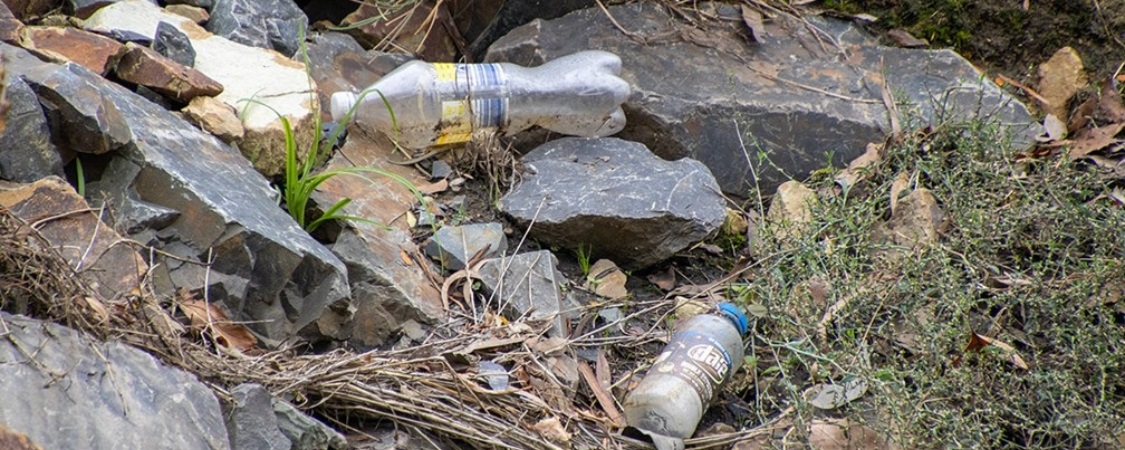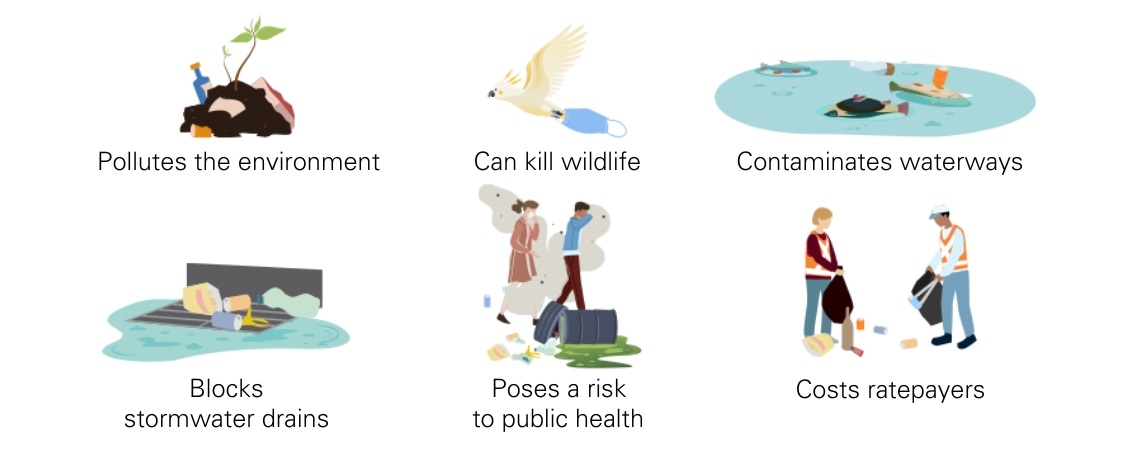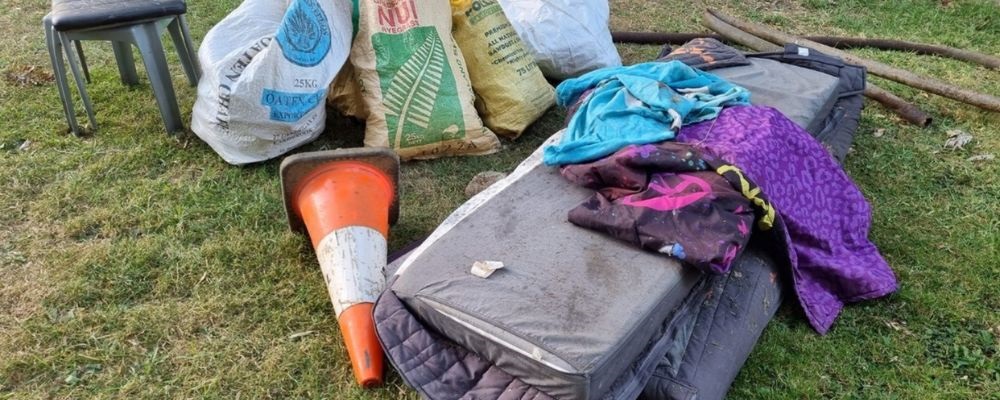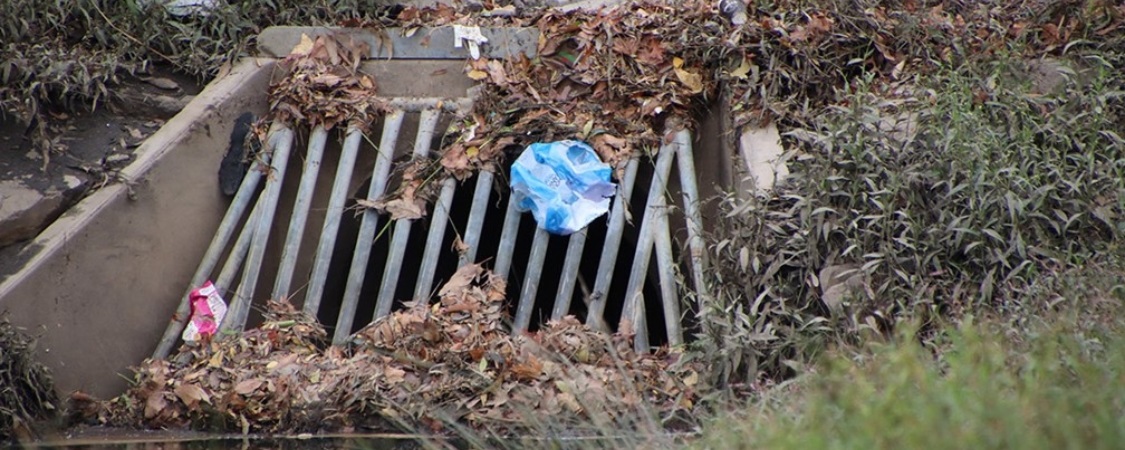Litter and illegal dumping
Littering and dumping waste is against the law. In Victoria, it's illegal to dump or bury waste anywhere without a license, even on private land. You can report illegal dumping and littering to Council or the Environmental Protection Authority Victoria (EPA).
Litter and rubbish
Litter is waste in the wrong place. Littering is the unlawful deposit of any type of waste material that is less than 50 litres in volume. Litter costs Victorians over $80 million per year.
Litter on our streets, in our parks and near waterways pollutes the environment, kills wildlife and poses a risk to public health.
What is considered littering?

Common types of litter include:
The following types of activities would be considered as littering:
- leaving items beside an overflowing bin
- dropping your banana peel on the ground
- leaving take away packaging behind at a park table
- releasing balloons at a celebration. Please ensure that balloons are disposed of in the general waste bin. Report balloon releases to the EPA.
- throwing a cigarette butt out of your car window
- not picking up after your dog while on a walk
- lawn clippings being swept into gutters and drains
- dumping your garden waste into a local reserve
Help keep Maroondah beautiful by placing all your waste into a rubbish or recycling bin. If no bin is available, please take your waste home with you. This includes picking up after your dog at the park.
See ways to dispose and recycle your waste in Maroondah.
What is the issue with littering?
95% of the litter on beaches comes from suburban streets through the stormwater system. Litter, such as cigarette butts, plastic bags and other plastics harms animal and marine life in a variety of ways:
- through polluting the water they live in
- when these items are mistaken for food
- when creatures get caught up in plastics and get injured or even strangled
- breaking down into microplastics (less than 5mm) which are persistent and difficult to recover
What are the impacts of litter?

There are also a number of impacts of litter on our local environment and community health:
- can cause blockages in the storm water system and flooding
- can be dangerous to people particularly when it involves items such as broken glass, needles and syringes
- may be a fire hazard
- makes an area look dirty and uncared for and attracts more litter. Littered areas are not pleasant to be in and are less likely to be used by people. In contrast, people are more reluctant to litter clean areas
- is a direct financial cost to local and state governments, and consequently to the community
- is one of the most visible signs of pollution and waste of resources
Report litter
You can make a difference. Help us protect Maroondah’s natural environment – report litter now.
When reporting litter:
- take photos
- record vehicle registration number/s and
- note the address or location.
Report litter
Illegal dumping
Illegal dumping is the purposeful act of discarding rubbish onto land which is not licensed to accept that waste. Generally, illegal dumping refers to large or multiple items dumped into bushland or on naturestrips.
What is considered illegally dumped rubbish?

Common types of illegally dumped rubbish include:
- Unbooked hard waste
- Construction waste
- Furniture
- Bags of rubbish
- Tyres
- Garden waste - which can include lawn clippings, branches, weeds, leaves or soil
See ways to dispose and recycle your waste in Maroondah.
What is the issue with illegal dumping?
Every year Victoria spends $30 million to investigate and remove illegally dumped rubbish. Not only does illegal dumping cost Councils a lot of money, it also impacts on the amenity of the local area by reducing perceived safety, as well as attracting more dumped rubbish. In some circumstances it can even reduce the value of a property or area.
There are also several environmental and safety risks associated with dumped rubbish. Certain types of dumped rubbish such as medical waste or asbestos poses a public health risk. Illegally dumped rubbish can harm the local environment by causing physical pollution to the environment, block stormwater drains and can also attract insects and pests. Materials such as tyres and chemicals can also pose a fire hazard.
Report illegal dumping
When reporting illegal dumping:
- take photos
- record vehicle registration number/s and
- note the address or location.
Traffic or road safety concern
If there has been dumped waste that causes a traffic or road safety concern, report it to VicRoads.
Report to VicRoads
At train stations or near train tracks
Contact Metro Trains to report littering and illegal dumping at train stations and near train tracks.
Report to Metro Trains
On Council land
Report illegal dumping on Council land or residential roads to Council online, by email at maroondah@maroondah.vic.gov.au or by calling Customer Service on 1300 88 22 33.
What you can report to Council:
Report to Council
Not on Council land
You can report illegal dumping that is not on Council land directly to the EPA through the 24 hours pollution hotline (1300 372 842) or by submitting a pollution report online.
What you can report to EPA:
- Littering from vehicles, including cigarette butts and food packaging. You can report directly through their online litter reporting form.
- Waste pollution, such as illegal waste disposal (also known as illegal dumping). This can include dumping of tyres, old cars and industrial, commercial and construction waste.
- Air pollution issues, for example smoke in the air, dust from a demolition or construction site or smoky vehicles.
- Illegal storage of soft plastics or the use of banned plastic bags or other banned single-use plastics.
- Foul smells and offensive odours from industry, such as landfills, animal processors, sewage treatment or composting facilities.
- Unreasonable noise from construction sites, industrial and commercial businesses and entertainment venues.
- Water pollution, for example if you notice chemicals entering our stormwater system or waterways, or if you see fish deaths.
Following a report, littering fines may be issued by the EPA:
- to an individual – $385 for a small piece of litter or $769 for a lit cigarette or burning litter
- to a corporation – $1923 for a small piece of litter or $3846 for a lit cigarette or burning litter
Report to EPA
Keeping our waterways clean
Keeping our rivers and other waterways clean of litter, waste and other pollutants is a shared responsibility between Council, Melbourne Water, Department of Energy, Environment and Climate Action (DEECA), EPA and Parks Victoria. Council manages and monitors smaller stormwater drains, litter traps and pits to prevent litter entering the drain network. Council’s drains eventually join Melbourne Water’s main stormwater drainage system that carries the water to creeks, rivers and eventually Port Phillip Bay.
What is a litter trap?
A litter trap is a specially designed pit that effectively captures litter that passes through. It is cleaned out on a regular basis. Currently Maroondah has 12 active litter traps.
There are many actions residents can take to keep litter out of these traps in the first place.
How to protect our waterways at home

- Make sure all rubbish, including cigarette butts, is put in a bin.
- Do not sweep leaves and green waste into the gutter. Compost them or make sure they are collected using Council or other collection services.
- Carry plastic bags while walking your dog so you can pick up their waste and place it in a bin.
- Don’t put household chemicals, oils or paints into the stormwater system - dispose of them at a Detox your Home chemical collection event or at a recycling and waste centre.
Further information
What is Council doing to reduce litter and illegal dumping in Maroondah
Although the amount of illegal dumping in Maroondah is less substantial than what occurs in other Councils, there is still a need to act to reduce litter and illegal dumping.
Our community values it’s leafy green public spaces. As highlighted in our Waste, Litter and Resource Recovery Strategy 2020-2030, public place litter bin collection services are seen as an important way to keep Maroondah’s public places clean.
Access to bins, reducing illegal dumping of household rubbish, and educating the broader community on the impact of litter on our rivers and oceans are some of the actions Council is taking to protect our natural assets.
Members of the public who are found to have dumped rubbish are educated, requested to remove the waste, and where the person isn’t compliant, fined to recoup some of the cost of the waste disposal and officer time. Proactive work, such as education door knocks and letters, the use of surveillance cameras, and installing educational and warning signs, are also undertaken.
Maroondah City Council also supports Clean up Australia day by coordinating and disposing of the litter collected by registered Clean up Australia Day sites in Maroondah.
You can read more about what we’re doing in our Waste, Litter and Resource Recovery Strategy 2020-2030.